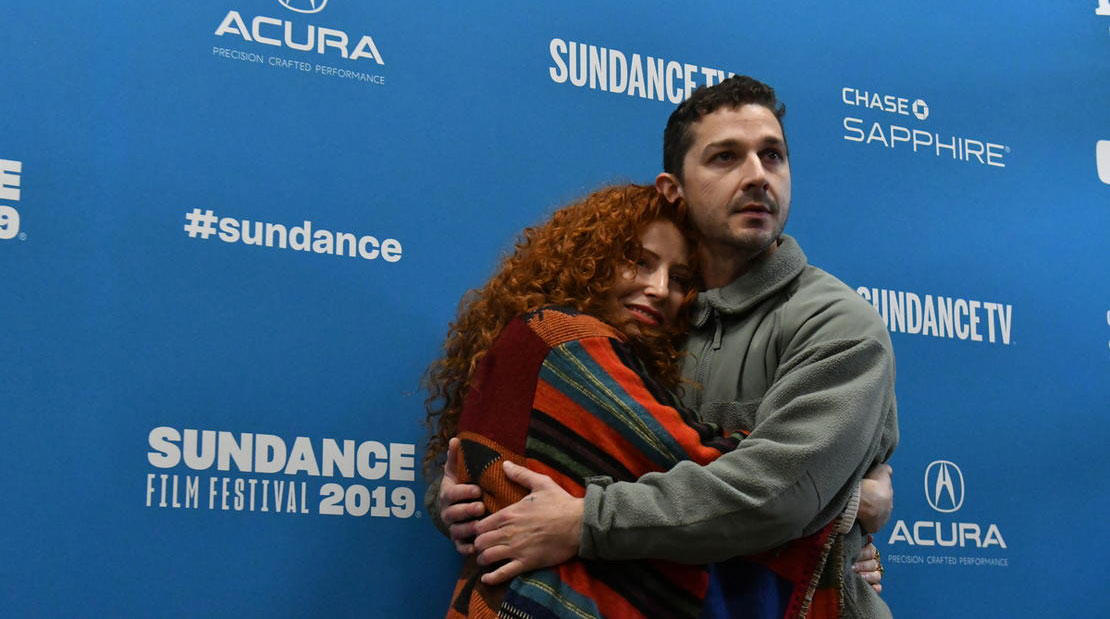Sundance Institute
Honey Boy
By Dana Kendall
When director Alma Har’el first met Shia LaBeouf, she discovered that both of their fathers were alcoholics—and “all children of alcoholics are my brothers and sisters,” she explained at the world premiere screening of Honey Boy, written by LaBeouf and based on his troubled childhood.

The two collaborated on a number of other projects before LaBeouf’s screenwriting debut—but this screenplay didn’t start off as a film project at all; it began as an assignment during his recovery. While in rehab, LaBeouf was tasked with writing down his life experiences, and they came out in script form simply because of his tendency for narrative. When the next step came—sharing his experiences with a friend he could trust—he sent the script to Alma.
“I sent it to Alma [as a script] almost in jest, and then she wrote back: ‘This is it.’ We had been looking for something for a while, … and it just felt like this was the perfect thing, where there wouldn’t be much acting or directing required. This is what we thought in theory [but] it was a very difficult movie to make.”
Unlike other collaborations with Har’el, where LaBeouf was relatively hands-off, “This was like gestalt therapy, so we were on top of each other from the minute I got out of rehab.”
LaBeouf plays the role of his father, a domineering ex-convict recovering from drug abuse whose own failed attempts at show business drive him to live vicariously through his son’s acting career. Noah Jupe, playing the young Shia, brilliantly captures the pointed conflict inside the mind of a 12-year-old boy who continually seeks for the tenderness he needs where there is none to be found.
When asked how the two bonded on set, Jupe explained that “it was mostly Magic: The Gathering [the card game], to be honest, but Shia is my best friend, and that made it so much easier on set. And it sounds weird because obviously he was playing someone who wasn’t meant to be necessarily my friend, but because he was so close off set, on set when he would be distant from me, I really felt it. In the scenes, I wanted him to come give me a hug, I wanted to talk to him, but I couldn’t. And that really helped me channel the emotion and be able to play the scenes.”
LaBeouf said of Jupe, “He softened me, you know. I came to him with all my problems at the time, which were a lot. I didn’t talk to him like a kid. … He never was a kid to me. He was always my contemporary, my equal.”
When asked how the making of the film has aided his recovery process, LaBeouf confided that, as he began working on the project, he reconnected with his father, who he hadn’t spoken to in six or seven years. But, he explained, “It’s strange to fetishize your pain and make a product out of it, and then you feel guilty about that, because it felt very selfish. I never went into this thinking, ‘Let me help people.’ That wasn’t my goal; I was falling apart.”
Untitled Amazing Johnathan Documentary
By Eric Hynes
Nothing turns out the way you ever could have expected in Ben Berman’s The Untitled Amazing Johnathan Documentary, which debuted on Friday morning at the MARC Theater as part of the U.S. Documentary Competition. Yet it’s only appropriate that the movie about a master of sleight of hand would have a few sleights up its sleeve. Furthermore, it’s only appropriate considering the tricks of the documentary trade, which Berman’s debut documentary provocatively explores.

His movie starts out as a relatively straightforward profile of standup comedian/magician John Edward Szeles, aka The Amazing Johnathan. After several decades of taking his act to comedy clubs, late night television, and Las Vegas, Johnathan retired from performing in light of a health diagnosis that gave him a year to live. Berman finds him two years after that year had expired, still living in his sprawling Las Vegas home with his wife, Anastasia Synn. Bored and sick of convalescing, Johnathan decides to mount a comeback/farewell tour. It’s while traveling from gig to gig with the performer that Berman discovers Johnathan’s been keeping some secrets—the kind of secrets that can derail a project such as this one. But instead of letting these revelations ruin everything, Berman drives straight into the complications, making them the new focus of the film. Things get only more unpredictable from there, leading Berman to question his own motivations, as well as Johnathan’s truthfulness from the start.
During the post-screening discussion, an audience member asked Berman if the wild twists and turns in the film were just another trick. He insisted, “It’s absolutely real shit that happened,” but he appreciated why his film begged the question. “The biggest theme of the movie is trying to determine what’s truth versus what’s illusion, so to have that experience continue into you guys watching is exciting.” Berman was joined on stage by The Amazing Johnathan himself, along with other subjects who are difficult to mention without spoiling some of the film’s tastier revelations. Johnathan was in good form, ad-libbing retorts and put-downs toward both his collaborators and audience members. Regarding his relationship with Berman, he said it was only toward the end, when the latter became distrustful, that they experienced a strain. Yet things turned out well enough to bring them all to the Festival, and to a wider rediscovery of the performer’s work. “When you’re told you’re dying, you want some kind of a record of your legacy. Ben took care of that for me,” he said. “A couple more years would be nice. But this is also great.”
Where’s My Roy Cohn?
By Jeremy Kinser
Can a man’s legacy be entirely evil? That’s the convincing case made by filmmaker Matt Tyrnauer in his fascinating and very timely new documentary Where’s My Roy Cohn?, which examines the life and career of the late attorney, who was one of the most powerful and corrupt men of the 20th century and whose reach extends to the current White House administration.

Having recently directed docs about a decadent nightclub (Studio 54) and an infamous pimp (Scotty and the Secret History of Hollywood), Tyrnauer has found his most notorious subject in Cohn. In archival footage, Cohn announces to a reporter that his epitaph will read that he was Senator McCarthy’s aide. Indeed, this film chronicles the Machiavellian impact he had on U.S. politics, from his campaign to have Ethel and Julius Rosenberg sentenced to death in the early 1950s to instructing his final client, Donald Trump, on the importance of winning at any cost.
Many of Cohn’s relatives and colleagues weigh in with revealing personal anecdotes, offering further proof that Cohn was a sinister character who loathed being both Jewish and a closeted gay man. Several appearances by Cohn protégé and Republican strategist Roger Stone, who’d been arrested by the FBI the same morning, brought continued laughter from the audience.
Tyrnauer revealed that he decided to make the movie on the day Trump was elected in 2016. Before that moment, he believed both Trump and Cohn would have become footnotes in U.S. history. He insisted that he didn’t want to make a film about Trump, but the president’s presence weighs heavily in the documentary. In fact, he’s responsible for the film’s title.
During the Q&A that followed the premiere, the director shared, “In 2017 during the Trump win, when his Justice Dept. and White House council was not doing his personal bidding as they would a fascist dictator, he blurted out, ‘Where’s my Roy Cohn?’ Hence, the title of our story today.”
Cohn was our modern Machiavelli, according to Tyrnauer. “We need to consider him very carefully and have a deep understanding,” he added. “Those who do not remember history are doomed to repeat it. This film is meant as an antidote to that.”
The Farewell
by Dana Kendall
When Director of Programming Kim Yutani introduced the world premiere of The Farewell, she took audiences through what it has been like over the past few months as she geared up for her first Festival in this new role.
“When you start programming, you don’t always know what you’re going to get. But when you see a film like The Farewell, you know that things are going to be okay. In fact, they’re going to be great.”

The feature is “based on real lies” from writer/director Lulu Wang’s own family, as previously chronicled in an episode This American Life. When Wang’s grandmother (“nai nai” in Mandarin) was diagnosed with terminal cancer, her family put together a wedding in China for Wang’s cousin as an excuse for everyone to see Nai Nai one last time—all while never telling her that she was sick.
The film stars Awkwafina in her first lead role in a drama, a big shift for the comedic actress. As she prepared for the most emotional scene, she confessed to Wang, “‘I don’t think I have it in me to cry. I don’t think I’m that kind of actress. I don’t think I can do it.’ [But] I was waterworks when we were blocking.” Despite her trepidation, she connected with the material as she thought about her own family: “I was crying for my own grandma, I was crying for something real. There’s real emotion in this movie. It’s deeply human, and I’m very proud to have been in it.”
American audiences might come into the film with the assumption that the family is in the wrong, but Wang hopes that you’ll come out of it understanding the reasoning behind it, and understanding a little bit more about Eastern cultures. Whereas many Westerners see their lives as belonging to themselves, it’s different for Chinese people, who deeply believe they are part of a greater whole—and for some, protecting a family member from tragic news might be a way to take a life-altering burden away from someone you love dearly.
When asked whether she intended this story for an American or Asian audience, Wang explained, “I wasn’t necessarily thinking of one particular market over another, because I am not in one market or the other. My whole life has been in between, and I resonate with stories based on the theme and the characters and the people and the humanity. And I think if I made it for anybody, I made it for the people that live their lives somewhere in between.”
American Factory
By Eric Hynes
Six years after General Motors left town, putting thousands of residents out of work, a Chinese car-glass company named Fuyao moved into the abandoned factory in Dayton, Ohio, bringing with it employment and optimism. Shot over three years in Dayton and Fuqing, Fujian Province, China, and offering intimate portraiture of both American and Chinese workers, managers, and executives, American Factory is a thoroughgoing, consistently eye-opening nonfiction epic. Directed by veteran Ohioan documentarians Julia Reichert and Steve Bognar (The Lion in the House, U.S. Documentary Competition, 2006), the film traces events from a spirited grand opening to deepening cultural impasses, developing safety concerns, and an embattled effort to unionize despite resistance from the Chinese-led management. It covers a lot of ground, yet stays close to the factory floor, to the experiences of those struggling to make a living and adjust to change, while also maintaining close access to those in charge, including CEO Cao Dewang.

“There are so many stories in this story—management, cultures, unions, job loss, safety. It can really truly open up a lot of worlds,” said Jill Lamantia during a moving Q&A that featured four current or former Fuyao employees in addition to the directors and film team. “It’s not just about pro-union politics, or about safety. It’s about two cultures and two different types of people that witness the same stresses in their lives,” said John Crane, former safety manager for Fuyao. Differences, and conflicts with management, tended to come from different expectations for workers, which arise in real time in the film. “He’s used to working 12 hours, we’re not. He’s used to doing things because it’s his job. We need to know why, when, where and how before we do it,” Crane added.
Crane expressed his respect and love for his Chinese colleagues, especially Wong He, lead Furnace Engineer in OEM Tempering at Fuyao. Wong and Crane embraced on stage, after which Wong said, “Right from the first day I never felt I was a foreigner. I always felt that the American people were welcoming.” Scenes from the film bear that out, as well as Wong’s openness and thoughtfulness regarding the factory’s growing pains.
“What we saw on a worker to worker level was a lot of curiosity and understanding and excitement,” said Reichert. “While what we saw on more of an owner-manager level was an appeal to nationalism. You’re different from them, we’re better from them. There was basically a big class difference that we saw.”
“We’re obviously in a time where one’s appeal to nationalism is growing. It’s happening in Eastern Europe, here, China, it’s left and right, up and down. If working people can realize that their interests are more common among each other—not based on culture, but on labor and work—we have a chance,” said Bognar. “We’re not policy experts. But what we saw were the tectonic plates moving. The last 40 years, what’s happened in China is millennially historic. 500 million people lifted out of poverty. That’s a good thing. People aren’t starving anymore. But it’s altered the world. It is altering the world. So what do we do? How do we grapple with that?”
“We hope that working people around the world can find ways to get a voice, to have agency. To have some balance of power against the rising billionaire class around the world,” said Reichert.
Lamantia interjected that the main, baseline expectation should be that everyone should receive a living wage. “It’s not like I’m asking for a Maserati. We in America shouldn’t have to work three jobs to make it work. There shouldn’t be this huge gap between millionaires and poverty.”
Ms. Purple
by Jeremy Kinser
In writer/director Justin Chon’s compelling, heartfelt Ms. Purple, young Korean American Kasie, who works as a hostess earning tips catering to the whims of wealthy businessmen at night, reconnects with her estranged brother to care for their dying father.
Although the film is often very grim and violent, Chon sees it as ultimately a hopeful story. “My thing with this film is there needs to be some sort of redemption, something to be learned from Kasie,” he said. “I thought that if people left the theater with no hope, they’d think, ‘What the fuck?’ I think great storytelling is a guide to how you should live your life and she’s trying her best. I think I achieved that through the contrast of what she goes through and honestly depicting it.”

It’s a personal story for Chon, who won the 2017 NEXT Audience Award for Gook. The director revealed that its one he’s been wanting to tell for many years and is loosely based on his own relationship with his younger sister. “We have a great relationship,” he told the audience. “I love her, but I hate her. I wanted to do something about a brother and sister. I think it’s a very specific type of relationship.”
Starring in her first feature film, Tiffany Chu is a standout. Chon admitted that he discovered her after placing an ad on Facebook. “She came in and right away I thought she had this gravitas and this energy,” he said.
Chu added that she identified with her character even though she doesn’t have a sibling. “This film goes out to all those people who come here so their children will have better choices,” she said. “I think because the film shows what she’s going through you can relate to her emotional struggles and it shows you don’t have to have the same skin color to relate to each other.”




